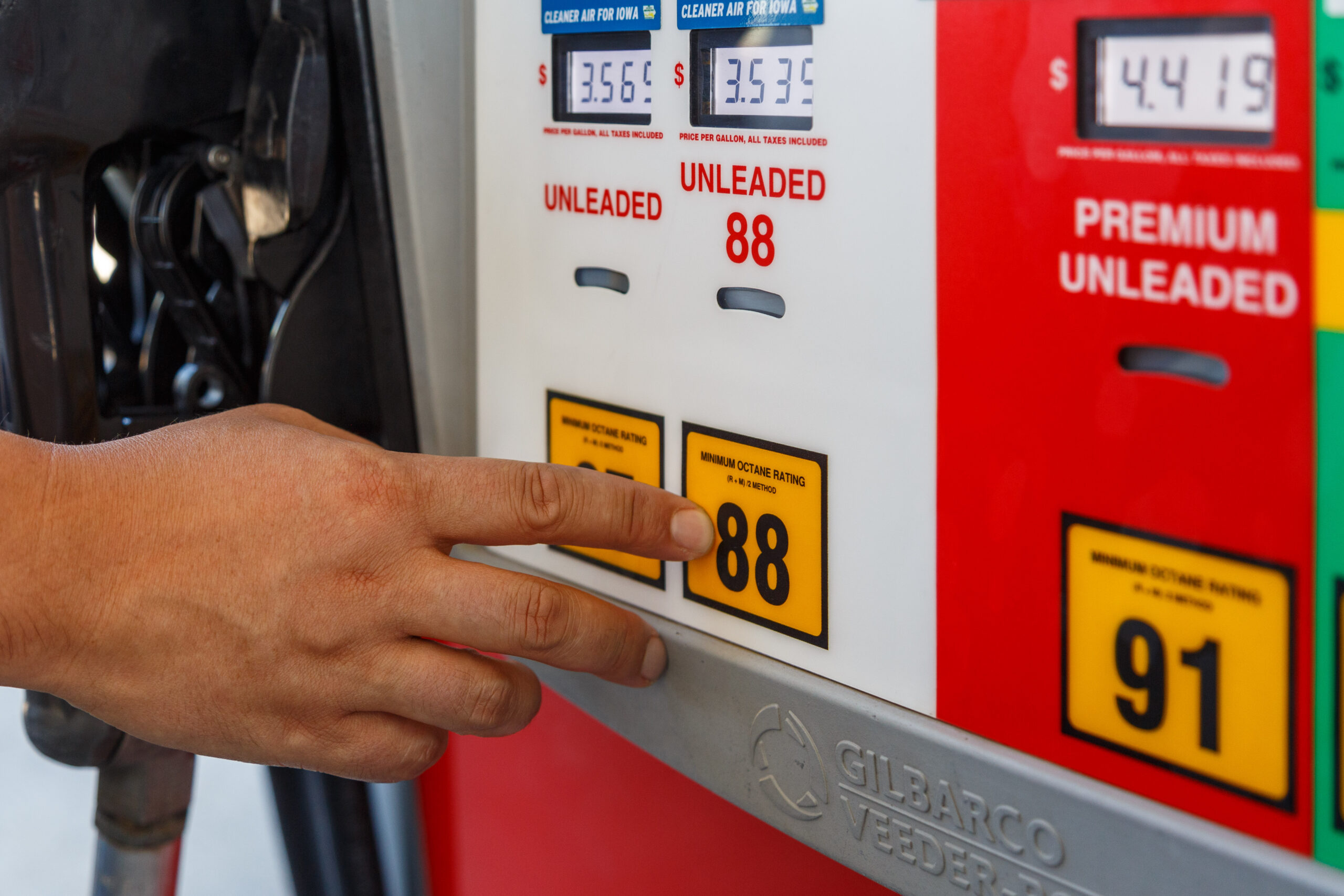
Drivers want options at the pump – and fuel blended with a higher percentage of biofuels like ethanol offer them an engine smart, earth kind lower cost fuel option.
Lowering Cost
E15—often seen at the pump as UNL88—is a fuel blended with 15 percent ethanol blended fuel that can be found at over 3,200 gas stations across the country. This summer, amid rising gas prices, drivers saved an average of 15 cents per gallons by filling up with E15 compared to regular, or E10. In some areas, E15 saved drivers as much as $.60 per gallon at the pump.
Reducing Emissions
Leveraging higher blends of renewable fuel like ethanol can make an immediate positive impact on the environment. Using more of this earth-kind fuel is critical to reaching ambitious climate goals to lower emissions and decrease air pollution. By itself, ethanol reduces greenhouse gas emissions by 46% compared to regular gasoline. A simple change to nationwide E15 would reduce CO2 emissions by more than 17.62 million tons per year – the equivalent of taking 3.85 million cars off the road.
A 2022 study from University of California – Riverside found that shifting from E10 to E15 reduces emissions, illustrating the vital role that higher ethanol blends play in protecting our air, our climate, and our health.
A Better Value at the Pump
A 2022 study found that a nationwide standard for E15 would:
- Save consumers $20.6 billion in annual fuel costs,
- Put an additional $36.3 billion in income into the pockets of American households,
- Support an additional 188,000 jobs, and
- Generate $66.3 billion for the U.S. GDP.
E15 Policy Priorities
Among Growth Energy’s 2023 policy priorities is to expand access to lower-carbon, lower-cost higher blends of ethanol at the pump at home and abroad by:
- Restoring unrestricted access to E15 year-round nationwide.
- Working with U.S. Department of Agriculture to swiftly implement and distribute the $500 million for biofuels infrastructure included in the Inflation Reduction Act (IRA).
- Clarifying rules around the use of existing fuel storage and dispensing equipment for E15.
- Finalizing EPA’s proposal to simplify onerous labeling requirements at fuel pumps and broaden use of existing underground storage tanks.
- Breaking down trade barriers to low-carbon ethanol in markets like Brazil, India, and China.
Instituting a nationwide octane standard.
Current Federal Legislation
Nationwide Consumer and Fuel Retailer Choice Act
Introduced by Senator Deb Fischer (R-Neb.), Senator Shelly Moore-Capito (R-W.V.), Senator Tammy Duckworth (D-Ill.), and Senator Tammy Baldwin (D-Wisc.) to ensure the continued availability of low-carbon fifteen percent ethanol fuel blends (E15) in all fuels markets year-round in exchange for limited small refinery exemption trade-off. This legislation would permanently extend the 1.0 psi summertime Reid vapor pressure (RVP) waiver to ethanol blends beyond E10, thus eliminating any seasonal restrictions on sales.
Consumer and Fuel Retailer Choice Act
Introduced by Senators Deb Fischer (R-Neb.) and Amy Klobuchar (D-Minn.) in the Senate, and Reps. Adrian Smith (R-Neb.) and Angie Craig (D-Minn.) in the House), and to ensure the continued availability of low-carbon fifteen percent ethanol fuel blends (E15) in all fuel markets year-round. This legislation would permanently extend the 1.0 psi summertime Reid vapor pressure (RVP) waiver to ethanol blends beyond E10, thus eliminating any seasonal restrictions on sales.
In March 2023, Senator Chuck Grassley (R-Iowa) introduced the Next Generation Fuels Act, a bill that would allow for the sale of fuels with greater octane levels, thereby increasing the amount of ethanol that can be used in the fuel supply, and, in turn, lowering prices at the pump for consumers. The bipartisan legislation is cosponsored by Senators Amy Klobuchar (D-Minn.), Joni Ernst (R-Iowa), and Tammy Duckworth (D-Ill.).
E15 Waiver in the States and EPA’s Response
In 2022, a coalition of Midwest states sent a letter to EPA Administrator Regan calling for parity between E10 and E15 fuels through Section 211(h)(5) of the Clean Air Act. Combined, the states account for 14.79% of total gasoline demand in the U.S. and are home to 1,494 of the nation’s E15 retail sites
- Illinois (3.17% of U.S. gasoline demand, 155 E15 retailer sites)
- Wisconsin (1.85% of U.S. gasoline demand, 359 retailer sites)
- Minnesota (1.75% of U.S. gasoline demand, 388 retailer sites)
- Iowa (1.02% of U.S. gasoline demand, 289 retailer sites)
- Nebraska (0.66% of U.S. gasoline demand, 122 retailer sites)
- Ohio (3.69% of U.S. gasoline demand, 87 retailer sites)
- South Dakota (0.36% of U.S. gasoline demand, 24 retailer sites)
- Missouri (2.29% of U.S. gasoline demand, 70 retailer sites)
In April 2023, the EPA announced an emergency E15 waiver for the summer 2023 driving season. In his statement, EPA Administrator Michael Regan stated that “allowing E15 sales during the summer driving season will not only help increase fuel supply, but support American farmers, strengthen U.S. energy security, and provide relief to drivers across the country.”